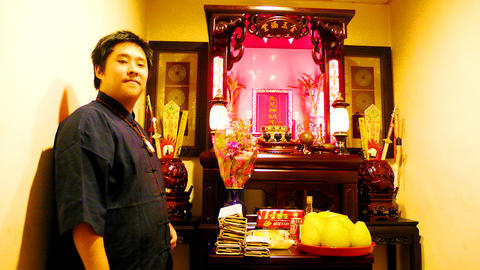Are young intellectuals 'possessed'?
/Anyway, he seems to have a fantasy vision of a historical China where people were rational and mental problems didn't exist. Well, it's kind of true, nobody called them mental problems. They called them "Shen Disturbances." No society of humans has ever been rational. Most of us have moments of rational thinking. People have built Lunar-Landers facilitated by institutions like NASA dedicated to rational thinking. But has anyone met a fully rational human being? (I'm thinking right now about a certain female astronaut who recently wore diapers on a cross-country drive.)
That's why I was shocked to learn that in Taiwan at least one out of every four university students, or young intellectuals who should belong to the class of literati in imperial China, is "depressed enough to benefit from assistance" of one kind or the other. That information was found, among other things, by a John Tung Foundation survey conducted between last May and June. An even more shocking finding was that the kinds of assistance these depressed young intellectuals are seeking include "divination" and "exorcism."
The survey shows at least 1.8 percent and a slightly lower 1.7 percent of the 6,960 respondents rely on divination and exorcism, respectively, for help in dealing with depression. Those who wish to seek counseling from school counselors account for a mere 2.3 percent, much fewer than another 3.3 percent of the students chanting sutras and/or praying for divine help. Still another 2.8 percent believe their folklore religion -- animism, or more often than not, outright superstition -- can cure their depression. Altogether, 11.9 percent of Taiwan's young intellectuals want supernatural powers to get rid of their psychiatric disorder.
Mr. Hung seems quite convinced that exorcism doesn't work, while I'm pretty sure therapy doesn't work either. Actually talisman, divination, drugs, exorcism, therapy--it all works sometimes--it can work when people actually make and follow through on new commitments. But don't be surprised to find humans dedicated to something irrational. The only people who could be surprised by that are people who aren't paying attention.

 There is a Daoist precept against subordination. In fact there is a precept (one of the 180 of Lord Lao) that says, "Do not serve in the military. If you must serve in the military do not serve in a subordinate position." I take this to mean join as an officer and be in a position to make decisions about life and death.
There is a Daoist precept against subordination. In fact there is a precept (one of the 180 of Lord Lao) that says, "Do not serve in the military. If you must serve in the military do not serve in a subordinate position." I take this to mean join as an officer and be in a position to make decisions about life and death.
 When a shaman purifies a space, she uses her acquired strength to forcibly evict all the ghosts and spirits that have taken up residence there. Since Daoists did not practice subordination to other entities and they were weak by precept and commitment, they didn’t actually purify the space immediately. Instead they bowed. The act of bowing is a declaration that human beings are going to temporarily use the space for meritorious actions. Bowing doesn’t scare away ghosts, or banish them. Bowing is a way of asking spirits to temporarily clear out. It is a declaration that the practice about to be performed will not be of any interest to ghosts. A ghost is an entity defined by weak, deficient, or lingering commitments.
When a shaman purifies a space, she uses her acquired strength to forcibly evict all the ghosts and spirits that have taken up residence there. Since Daoists did not practice subordination to other entities and they were weak by precept and commitment, they didn’t actually purify the space immediately. Instead they bowed. The act of bowing is a declaration that human beings are going to temporarily use the space for meritorious actions. Bowing doesn’t scare away ghosts, or banish them. Bowing is a way of asking spirits to temporarily clear out. It is a declaration that the practice about to be performed will not be of any interest to ghosts. A ghost is an entity defined by weak, deficient, or lingering commitments.
 Healing by Commitment
Healing by Commitment On Saturday I made it to the last session of this conference on
On Saturday I made it to the last session of this conference on  it seems like a good time to link to my own "
it seems like a good time to link to my own " Kick-boxing gym last night where fighters were jumping rope and doing endurance training. I'm willing to bet that any professional ballet dancer can beat these fighters in an endurance match.
Kick-boxing gym last night where fighters were jumping rope and doing endurance training. I'm willing to bet that any professional ballet dancer can beat these fighters in an endurance match. (think pain), contortion is a great option! San Francisco now has a world class contortion training program,
(think pain), contortion is a great option! San Francisco now has a world class contortion training program,  I hope you all had a lovely Halloween, hah, hah, haaa!
I hope you all had a lovely Halloween, hah, hah, haaa! The cult of Xian is extremely diverse. While there are some general suggestions about how to go about becoming a Xian, even manuals and programs to follow, there really is no method that works every time. Even though there are routes by which one may become a xian, like "Rising up in broad daylight with one's dogs and chickens," every process of becoming Xian is truly unique for that person, time and place.
The cult of Xian is extremely diverse. While there are some general suggestions about how to go about becoming a Xian, even manuals and programs to follow, there really is no method that works every time. Even though there are routes by which one may become a xian, like "Rising up in broad daylight with one's dogs and chickens," every process of becoming Xian is truly unique for that person, time and place. As I said yesterday, perhaps our most defining characteristic as human beings is our ability to make commitments. But such an observation brings with it the reality that we can make commitments to things which are not real, or not true. At one extreme we can make vague wishy-washy commitments, and at the other extreme we can swear an oath in blood to repeat and maintain a lie.
As I said yesterday, perhaps our most defining characteristic as human beings is our ability to make commitments. But such an observation brings with it the reality that we can make commitments to things which are not real, or not true. At one extreme we can make vague wishy-washy commitments, and at the other extreme we can swear an oath in blood to repeat and maintain a lie. At the moment of death everything which is subtle and light rises upward to join with heaven; and everything gross, heavy and thick sinks downward and becomes one with earth. The only problem is that this de-polarization can take a while to complete. The stuff that makes us what we are does not disperse immediately.
At the moment of death everything which is subtle and light rises upward to join with heaven; and everything gross, heavy and thick sinks downward and becomes one with earth. The only problem is that this de-polarization can take a while to complete. The stuff that makes us what we are does not disperse immediately.
 A Way of Life
A Way of Life Becoming an Immortal
Becoming an Immortal Chinese popular religion is pretty dynamic. This
Chinese popular religion is pretty dynamic. This  Daoist priests are also called Tianshi (Celestial Masters) because they are responsible for determining, managing and updating the hierarchy of gods. The Rabbit god falls under the control of the City God. The shrine to the City God was likely the focal point of martial arts training during the Song Dynasty, and is the context from which the word gongfu (Kungfu) got its meaning. Gongfu means "meritorious action," people training martial arts on behalf of the community did so as part of their participation in the cult of the City God.
Daoist priests are also called Tianshi (Celestial Masters) because they are responsible for determining, managing and updating the hierarchy of gods. The Rabbit god falls under the control of the City God. The shrine to the City God was likely the focal point of martial arts training during the Song Dynasty, and is the context from which the word gongfu (Kungfu) got its meaning. Gongfu means "meritorious action," people training martial arts on behalf of the community did so as part of their participation in the cult of the City God. In an earlier post I talked about the invocation of
In an earlier post I talked about the invocation of  teaching, except to say, "sit still."
teaching, except to say, "sit still."